It took the prime minister to remind BJP’s despondent karyakartas and supporters across the country that the combined INDI Alliance, despite their euphoria, has not even been able to match BJP’s tally of 240 in an election where BJP has supposedly been “humbled”, “rebuked”, and Narendra Modi’s “aura of invincibility punctured”. The Opposition, that came together to stop the Narendra Modi juggernaut, stopped at 234 seats with Congress chalking up the highest number of seats at 99.
It is easy to get carried away by the rhetoric, more so in the age of social media when algorithms box us into neat little echo chambers, but the fact remains that with BJP-led NDA alliance winning 292 seats, Modi is poised to become the only leader since Jawaharlal Nehru to assume the prime minister’s chair for three consecutive terms. What’s more, if he manages to stay in office till 2029, Modi will create a record since Nehru died two years into his third stint as PM.
These are no mean feats and yet, despite leading his party to unprecedented heights, Modi has delivered a win that feels very much like a defeat for the BJP. There are several reasons for this, but the primary one is that of self-created burden of expectations.
Modi had kicked off the election campaign with an oft-stated goal of 400 seats for NDA. That had set the bar of expectations so high that 240 seats at the end of two consecutive terms, which is an incredible achievement despite the obvious headwinds of anti-incumbency and would have been considered quite an accomplishment for the party that was knocked off power in 2004 by a Congress-led coalition, now seems like a shocking setback.
Remember that in 2004, when Congress led UPA-1 pipped Atal Bihari Vajpayee’s BJP to power, it had 145 seats in its kitty. Five years later in 2009 when the UPA-2 earned a second mandate, Congress’s figure stood at 206.
Despite its performance being adjudged as ‘dismal’, the BJP has broken through in Kerala, demolished the BJD in Lok Sabha as well as Assembly elections and has substantially increased its vote share in Tamil Nadu. The party has acquired nearly 2.5 times the number of seats of its nearest rival, but such has been the frame of reference in these polls that BJP’s failure to get 272 seats on its own is being interpreted as ‘severe underperformance’. The median of Indian politics has perhaps shifted forever.
Conversely, Congress, that limped to 52 seats in 2019 and was written off before the 2024 campaign had commenced, set its own bar of expectations so low that 99 seats seems to have catapulted the party into the seventh stage of delirium.
Rahul Gandhi has already thundered that “Modi doesn’t have the mandate to return to power”. It may be just a rhetorical exercise but is equally an indicator of the belligerent mood within the Opposition that may not only pose a tougher challenge for Modi in the next five years but may also upset all calculations if it manages to snatch away key allies from the NDA camp and either prevent BJP from coming to power or engineer a collapse in the near future.
All these are in the realm of speculation but what isn’t, is that Tuesday’s results mark India’s re-entry into the era of coalition politics. After the ‘wave elections’ of 2014 and 2019, when Modi’s appeal cut through the local issues and made the contest into presidential affairs, 2024 signals at least a partial return to ‘normalcy’ as Modi appeal wanes, and though the prime minister may have been able to lend a decisive edge to some of the seats for BJP, the absence of a dominating narrative was evident.
The elections developed into many cornered, localized contests with factors ranging from caste, community, candidate selection, inflation, unemployment, dissent against sitting MP and sundry other issues coming into play. In this revised scenario, suddenly regional satraps such as Akhilesh Yadav, Mamata Banerjee, or even Nitish Kumar and N Chandrababu Naidu gain renewed significance.
The coalition era will also be a new challenge for Modi and his trusted lieutenant Amit Shah as the duo, since their days in Gujarat, has never been short of a simple majority in forming and running a government. Forming the government will be the easier part. Modi may find that his reputation as ‘strong leader’ who never falters from taking tough decisions is getting severely tested since the 32-seat deficit makes it imperative for him to take along allies who may extract their suitable price.
It has become conventional wisdom that Modi is unsuitable for the vagaries of coalition politics. We shall soon know.
The author is Deputy Executive Editor, Firstpost. He tweets: @sreemoytalukdar. The views expressed in the above piece are personal and solely those of the author. They do not necessarily reflect Firstpost’s views.


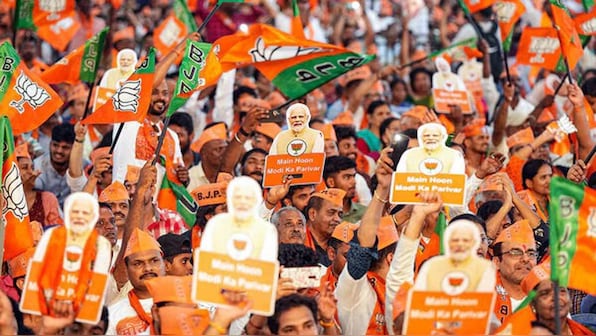




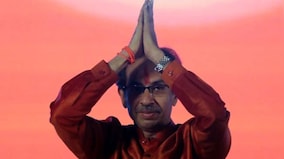
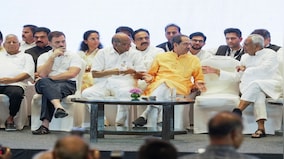
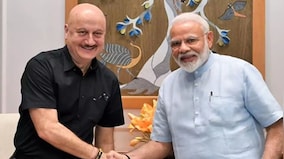
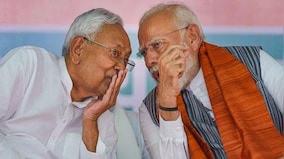
)
)
)
)